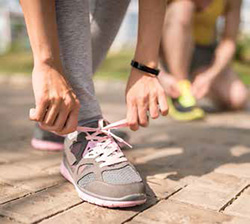Mental Health Advocacy
OTs Walk with NAMI
Downstate Occupational Therapy Program has committed to hosting and managing this community outreach project. We believe that community engagement and advocacy are crucial in creating inclusive, responsive, and sustainable communities to help promote equity.
Occupational therapy educators, clinicians, and students in New York City join forces with NAMI-NYC Metro, an affiliate of the National Alliance on Mental Illness, to help people walk for recovery, wellness, and an end to the stigma of mental illness.
Orginally produced in 2008 by David Doyle and Eileen LaMourie. Information in the video is still relevant and emphasizes the benefits of walking and it is great to hear first hand accounts as to why individuals enjoy walking.
The National Alliance on Mental Illness (NAMI) is a non-profit charitable organization whose mission is the eradication of mental illness and improvement in the quality of life for persons of all ages who are affected by mental illness. NAMI-NYC supports people affected by mental illness and their loved ones build better lives through education, support and advocacy. Among the values that NAMI supports are building community, fostering equity and inclusion, ensuring accessibility, supporting recovery and well-being, along with many other important key principles. Each year NAMI holds a walk that gathers thousands of supporters, including individuals, families, companies, and community organizations to fundraise and publicize their mission and services.
OTs Walk with NAMI began with an idea sparked by OT mental health educators Suzanne White, Mary Donohue, and Diane Tewfik. Together with graduate student Eileen LaMourie, they created a protocol that helps OT students and other health professionals establish a 12-session wellness program that culminates in participation at the annual NAMI fundraising walk.
Supporting Community-Based Mental Health

As the changing health care system expands to include more mental health services, occupational therapy is in a great position to promote the profession's role in this area. One way to do that is to create or join a city or statewide project based on the OTs Walk with NAMI (the National Alliance on Mental Illness) project, which was started in New York City by the Metropolitan New York District Mental Health Task Force.
OTs Walk with NAMI is a 12-session wellness curriculum that culminates in participating in the annual NAMI fundraising walk. Although the project began with targeting people with mental illness, it can also be used as a wellness program with other populations.
The OTs Walk with NAMI effort has brought together occupational therapy practitioners and students with consumers, their families, and other health care providers to fight stigma as well as raise awareness about the health needs of those with mental illness, and to raise money for mental health services, public education, and research support.
A number of resources for this project, including journal articles, information, and videos about such topics as the health benefits of walking routines, group protocols for walking groups, etc., can be found below.
If a walk is being organized or already exists, please contact us at ot.sohp@downstate.edu. We'd love to collaborate! A list of upcoming walks, and information on how to host a walk, can be found at NAMIWalks NYC.
Protocol
OT Walks With NAMI Group Protocol
Presentation
Supporting Materials
Quiz — Are You Ready To Walk for Your Health
Mood Scale Pre- and Post-Walk Session
Waist Measurements and Body Mass Index
Wearables/Activity Trackers 101
Yoga Exercises with Illustrations
Remember to measure the success of the program:
OTs Walk With NAMI Pre-Test and Post-Test Questionnaire
Don't forget to create a flyer for your walking group!
Here's some research articles to support your work:
-
- Kelly, P., Williamson, C., Niven, A. G., Hunter, R., Mutrie, N., & Richards, J. (2018). Walking on sunshine: scoping review of the evidence for walking and mental health. British Journal of Sports Medicine, 52(12), 800–806. https://doi-org.newproxy.downstate.edu/10.1136/bjsports-2017-098827
-
- Roe, J., Mondschein, A., Neale, C., Barnes, L., Boukhechba, M., & Lopez, S. (2020). The Urban Built Environment, Walking and Mental Health Outcomes Among Older Adults: A Pilot Study. Frontiers in Public Health, 8, 575946. https://doi-org.newproxy.downstate.edu/10.3389/fpubh.2020.575946
-
- Contreras-Osorio, F., Ramirez-Campillo, R., Cerda-Vega, E., Campos-Jara, R., Martínez-Salazar, C., Reigal, R. E., Hernández-Mendo, A., Carneiro, L., & Campos-Jara, C. (2022). Effects of Physical Exercise on Executive Function in Adults with Depression: A Systematic Review and Meta-Analysis. International Journal of Environmental Research and Public Health, 19(22), 15270. https://doi-org.newproxy.downstate.edu/10.3390/ijerph192215270
-
Brown, C., Cook, J. A., Jonikas, J. A., Steigman, P. J., Burke-Miller, J., Hamilton, M. M., Rosen, C., Tessman, D. C., & Santos, A. (2023). Nutrition and exercise for wellness and recovery: A randomized controlled trial of a community-based health intervention. Psychiatric Services (Washington, D.C.), 74(5), 463–471. https://doi.org/10.1176/appi.ps.202200038
-
Grainger, M., Gardner, J., Hicks, D., Moran, M., Scammacca, M., Kessaris, A., NesSmith, M., & Swarbrick, M. (2021). Pedometers as an intervention to increase physical activity among individuals with mental illness: A feasibility study. American Journal of Psychiatric Rehabilitation, 24(1), 52–67. https://muse.jhu.edu/pub/17/article/934162
-
Swarbrick, M., Nemec, P. B., Brandow, C. L., & Spagnolo, A. (2018). Strategies to promote walking among community-dwelling individuals with major mental disorders. Journal of Psychosocial Nursing and Mental Health Services, 56(3), 25–32. https://doi.org/10.3928/02793695-20171205-01
For further information:
Send an e-mail to ot.sohp@downstate.edu.